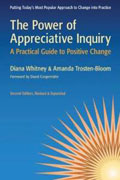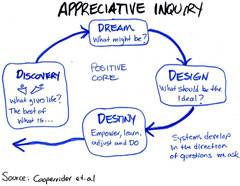What We're Reading Now
4 July 2011
Rachel found the academic underpinnings of her approach to organizational discovery when she read The Power of Appreciative Inquiry: A Practical Guide to Positive Change by Diana Whitney and Amanda Trosten-Bloom. (Thanks to ACHRA and presenter Anne Williams for the book suggestion!)
Tags:

In the past year, I've spent a fair bit of time with several clients conducting organizational assessments. While each has been a little bit different — there's as much variety in organizational DNA as there is in the human genome — it's been an interesting opportunity for me to observe what works (and what doesn't) when it comes to taking the pulse of an organization. I tend to stay away from approaches based solely on surveys, instruments, or prescriptive checklists. I gravitate to approaches that help explain or illustrate the stories behind the data. I look for patterns and anomalies. I try to let the data — and the people — speak.
While I often discover challenges and weaknesses (and, in fact, it's usually my job to help address them), there's another element that I try to bring to each client I serve: I appreciate. Whatever the organization, whatever its situation and circumstance, chances are pretty good that it has some reason for being and something that works. And since change is hard and taxes both organizations and the people in them, part of my role as consultant and advisor is to help clients identify what to celebrate and not simply what to fix. I do that by talking to a lot of people, asking open-ended questions, and listening carefully to the answers. For someone who can like a spreadsheet as much as I do, it's a pretty qualitative process. But I'm more and more confident that it works.
Turns out that some folks have spent the past 20 or so years taking this affirmative, people-based approach, studying it, and creating models that can live up there with Kotter's 8 Steps for Leading Change, McKinsey's 7S Framework, and Porter's Five Forces. It's called Appreciative Inquiry (or AI for short, not to be confused with Artificial Intelligence) and it's rooted in the belief that organizational performance can be most improved when people focus on expanding what's working rather than trying to fix what's not. In The Power of Appreciative Inquiry, Whitney and Trosten-Bloom (together with David Cooperrider) share the nuts and bolts of AI, complete with its consultant-y looking overview diagram:

As you might notice, the model looks similar to the others but the language used to describe appreciative inquiry is a little foreign to most organizational environments. (Let's face it... there aren't many places where I overhear employees talking about dreams and destiny in everyday conversation.) Unfortunately, I find that it makes AI theory a little like chocolate-covered bacon: while almost anyone brave enough to try it will be delighted by the experience, a large portion of the population won't get past the description. Our fairly low professional tolerance for things that feel 'hokey' gets in the way of an appreciative approach. (I have a higher threshold than most, but Whitney and Trosten-Bloom's guide made even me think I might be drinking cherry-flavored Kool-Aid.)
It's too bad, because there is real power in AI. Beyond the case studies in the book, I now have numerous first-hand experiences of the transformative power of an appreciative approach and a few good questions. (Want to see for yourself? Sit down with a colleague and ask him or her to tell you a story of a time when your workplace was at its best. Watch and listen. Repeat.) Fortunately, there's good news. We can take the best of appreciative inquiry and incorporate it into the way we assess organizations and manage change, and I'd say the Allison Partners team has been doing this for years. Want some tips? Feel free to call us and we'll gladly share. We'll make it a Kool-Aid optional conversation.







Comments
Our Comment Policy:
Our blog posts are only half of the conversation. What our readers have to say is equally important to us, and we're grateful for all the comments that continue the dialog.
To ensure that the discussion here is as useful as possible to all of our readers, please be respectful of our contributors and refrain from harassing, threatening and/or vulgar language. We reserve the right to screen and remove any comments from the site. If you have a question about a comment or want to discuss our policy, please contact us. We'll talk it over.
There are no comments for this entry yet.